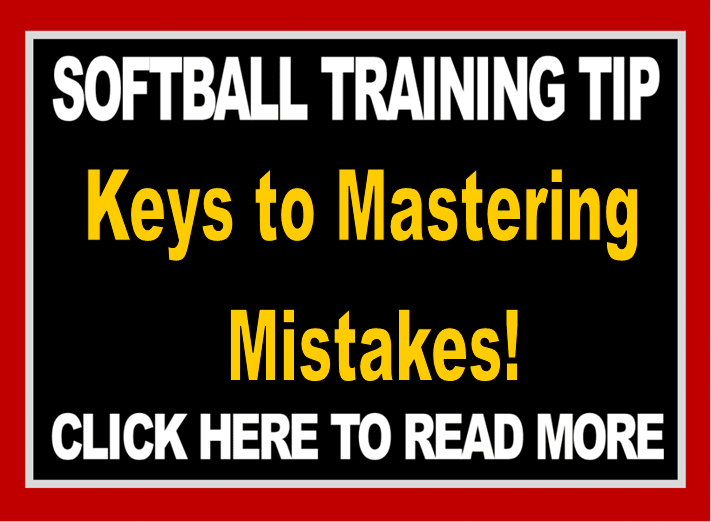
28 Mar Keys to Mastering Mistakes!

Here’s a question for you – Would your players consider you a Confidence Maker or a Confidence Breaker?
Uncover seven things that will help everyone better deal with (and hopefully even grow from) their mistakes.
Mistakes happen! Players are going to make mistakes in sports, and not always because they screw up. Mistakes happen for a lot of different reasons that we’ll discuss in a minute but how we (as in you AND your players) handle them can make all the difference in the world. Handle them well and mistakes can turn into fascinating clues that can lead you to a higher level of performance, while handling them poorly can take you down into the abyss.
But before we look at some things we can do to try and minimize, or better handle our mistakes, let’s first look at why we make them.
What Causes Us To Make Mistakes:
- Pressure – Pressure comes from a lot of different places and each of us have different pressure points. It’s very common that things like wanting to succeed, trying not to fail, not letting others down, not embarrassing ourselves and facing a big game are all pressure trigger points. Identifying the cause of a player’s pressure isn’t the point of this article but realizing that pressure can create errors definitely is. Some pressure is good as it will motivate you to do what you might not otherwise get done (think procrastination and a sudden time deadline), but too much pressure and we crack – sometimes literally. Pressure is one of the things that national championship winning football coach Urban Meyer noted as a reason for stepping away from coaching for awhile. Heart-attacks are another result of cracking under pressure but so is an overthrow into the parking lot or a pitch that lands in the press box. We all have it but we all respond to it differently.
- Care-lessness – When we first think of carelessness we think about someone not really caring about what they’re doing, which is what the name actually says. But a closer look finds that care-lessness can happen for a number of reasons; lack of attention, boredom, doing too many things at once (that’s me!), as well as generally not caring. Just a word of caution about this last one. Players that appear not to care in most cases really do care but are afraid to fail so acting like they don’t care gives their failure a reason.
- Lack of Skill – This seems to be the easy one to identify as causing mistakes since a lack of skill will certainly get you into trouble, and sooner rather than later. It doesn’t have to be a total lack of skill as an otherwise excellent shortstop may make horrible throws as a result of a lack of skill of throwing on the run. This is the one area that we as coaches spend a great deal of time trying to solve and yet it’s only one of 5 things that can lead to mistakes.
- Opponents – Too often we completely dismiss the role our opponents play in the mistakes we see our players make. Remember that unlike golf, where you play against yourself, softball is played against an opponent who is trying as hard as they can to keep you from doing what you’re trying really hard to do! They’re trying to bunt and you’re trying to stop them, they’re trying to score the runner from 2nd base and you’re trying to throw her out at home, and they’re trying to get you out on a riseball and you’re trying to hit it behind the runner. Mistakes are sometimes caused by moves the opposition makes to attack our weaknesses. The strength of your weaknesses will determine your strength.
- Speed – There’s a saying that Speed kills and when we’re talking about sports that saying should read, speed kills weak skills. In other words your players might be able to field, throw and catch but can they do it against a slapper that flies down to first base in 2.4 seconds? It’s not their lack of skills that hurt them or cause them to bobble the slap or else throw it away but rather the lack of their ability to do the skill at a faster speed.
- Risk – If you want your players to dive for that line drive or make that spin throw on a great bunt to force the runner out at 2nd, or take that extra base in a close game – those moves involve risk, and risk comes with the chance of failure – that’s why it’s called “risk”. Mistakes, or “missed-takes” are part of taking risks but risks are also a part of stretching your skills in order to eventually make them bigger and better.
Now that we have our list of 6 things that can cause mistakes I think it helps us as coaches realize that there are a lot of Mistake Traps out there. With all the players it takes to field a softball team and all the Mistake Traps it’s fairly likely that our players will make mistakes throughout the course of a practice, a game or a season. The important thing is to know how to handle them so everyone (you, the player and your team) can get right back on track and hopefully get better from it.
So let’s look at some things we can all do to help Turn Missed-Takes into Lessons That Will Help Us Succeed:
- Expect Them – We’ve already listed 6 things that can trip up even the best of players and result in mistakes so Lesson #1 is expect them. We don’t tend to be as freaked out when something happens that we expect so expect mistakes. That doesn’t mean I think you should expect them on every play from every player but know that they are going to happen so remind yourself AND your players that they will happen and we WILL survive them!
- Try – Fail – Learn – What’s important following a mistake is to LEARN something from it. Did you go too fast and lose your balance, then how can you make that same play again keeping your balance? What can you learn from what you just did? That’s the key question so anytime you or one of your players fail, simply pat them on the back and ask them – what can you learn from that? Then use that new knowledge on the next play to make yourself better.
- Cool Down – It’s an emotion-packed game and mistakes only intensify the emotion so it’s never good to start ranting and raving at a player following a mistake or to sometimes even approach them immediately afterwards. Let the player (and yourself) cool down. Help your player calm down by counting to 10, or stepping away from the team for a second, or just cooling it before talking about it. Let the emotion back down about 100 notches before you try and venture into the Mistake Zone.
- Leave Dead Horses Dead – The saying “don’t beat a dead horse” really applies to coaches, parents and players. Once a player has made a mistake, cooled down and pointed out what they learned from it then LEAVE IT! Quit pointing out to the player what they did wrong – they were there! They not only saw it, they did it! They don’t need an instant replay of the mistake, what they need is your support.
- Encourage – Support – Believe – Coaches are the leaders so lead! Players don’t need leaders when things are going great, they need them when things are falling apart around them – so lead! Lead with encouragement and support and belief. Convey belief in your players ability to rebound from mistakes with your tone of voice, your words, your body language and their playing time. You can’t say you believe in me and then bench me the rest of the month. Show me your words with your actions.
- The Game Doesn’t Know – national championship winning softball coach Sue Enquist always says that the game doesn’t know who should win, and I’d like to take Sue’s saying and add that the game doesn’t know when it’s a bad time to make a mistake. Just because you expect mistakes to happen doesn’t mean they’re only going to happen when you’re up by 15 with 2 outs. The game doesn’t know that a wild pitch now will cost your team the National Championship! And because it doesn’t know it means they can happen at any time. Avoid using the crazy line – “didn’t you know this was a horrible time for you to do something like that?” Really…
- Move On – After all of this, simply pat your player on the back, give them a smile and move on to the next play. Leave the past in the past and move on – there’s too much to accomplish in the future to keep bringing up the past!
Mistakes are a part of competition but they don’t have to be the end. Recover from them by following a shot into the trees with a chip 6 inches from the hole. Follow-up that throw into the parking lot by turning a double play. Forget the walks and errors that loaded the bases and strike out the side. Mistakes are quickly forgotten when they’re followed up with incredible rebounds.
Be the source for those rebounds by being a confidence reminder, confidence builder, and confidence supplier. Players don’t come to you in the form you ultimately want them to be – that’s your job as a coach – to shape them into what they are capable of being, even if they can’t see it, don’t believe it or don’t even think it’s possible! As we start an exciting new season let’s all work to be confidence makers instead of confidence breakers so we can help our young athletes experience the joy of overcoming their mistakes on their way to playing championship softball!
Good luck to everyone and may you have a fantastic season!



